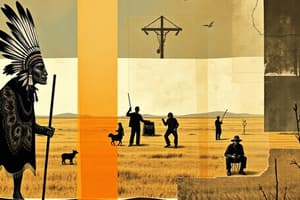Podcast
Questions and Answers
What is a key difference between the economic activities of hunting and gathering cultures and those of farming societies?
What is a key difference between the economic activities of hunting and gathering cultures and those of farming societies?
- immediacy vs. long-term planning (correct)
- cooperation vs. individualism
- trade vs. self-sufficiency
- nomadic vs. sedentary
What drives the future-oriented nature of farming societies?
What drives the future-oriented nature of farming societies?
- The need to protect against natural disasters
- The desire to achieve a specific social status
- The need to store food for the winter
- The hope of securing a future harvest (correct)
In what way do San languages reflect the present-oriented nature of hunting and gathering cultures?
In what way do San languages reflect the present-oriented nature of hunting and gathering cultures?
- They lack nuanced descriptions of the past and future (correct)
- They have complex grammatical structures for describing the past
- They use more verb conjugations than other languages
- They have limited vocabulary for describing emotions
What is a characteristic of immediate return economies?
What is a characteristic of immediate return economies?
What motivates people in hunting and gathering cultures to focus on the present?
What motivates people in hunting and gathering cultures to focus on the present?
How do farmers typically interact with their environment?
How do farmers typically interact with their environment?
What is unique about the grammar of San languages?
What is unique about the grammar of San languages?
What is a common feature of the economic activities of most people in the industrialized world?
What is a common feature of the economic activities of most people in the industrialized world?
What has been a primary focus of Suzman's work with the San?
What has been a primary focus of Suzman's work with the San?
Why does Suzman find it wonderful to be an uninvited guest in the San's community?
Why does Suzman find it wonderful to be an uninvited guest in the San's community?
How does Suzman describe his experience with the San's traditional hunting and gathering world?
How does Suzman describe his experience with the San's traditional hunting and gathering world?
What kind of interpersonal bonds does Suzman develop with the San community?
What kind of interpersonal bonds does Suzman develop with the San community?
Which of the following issues did Suzman help the San navigate?
Which of the following issues did Suzman help the San navigate?
How do urbanized people try to manage their sense of time, according to Suzman?
How do urbanized people try to manage their sense of time, according to Suzman?
What makes it difficult to understand that different people may experience time differently?
What makes it difficult to understand that different people may experience time differently?
What does Suzman say about the experience of time in the urbanized world?
What does Suzman say about the experience of time in the urbanized world?
Flashcards are hidden until you start studying
Study Notes
Anthropologist's Experience with the San
- Worked with the San for over 20 years, focusing on understanding their lives transformed by colonialism, land dispossession, and loss.
- Interested in how they navigate the interface between the Stone Age and the digital age.
Involvement in San Issues
- As an anthropologist, got involved in issues that matter most to the San, such as employment rights, political representation, access to medical services, and education.
- Helped them navigate political and economic challenges that determine their future.
Traditional Notion of Time among the San
- The San experience time differently, with a focus on the present moment.
- Their practical engagement with their environment created a culture attuned to living in the moment.
- Unlike farmers, who are future-oriented, San economic activities are focused on satisfying immediate or short-term needs.
Characteristics of San Economies
- Immediate return economies, where most economic activity is based on satisfying immediate needs.
- Hunting and gathering cultures have absolute confidence in the providence of their environments and its ability to meet their material needs.
San Languages
- San languages reflect their focus on the present moment, lacking grammatical tools to describe the past or future in nuanced ways.
- In Ju/'hoan language, the past tense is denoted by a single participle, with limited categories to define the past, such as "earlier", "later", "yesterday", "last month", and "last year".
- No pluperfect, no past imperfect, and no linear calendars to hang memorable events.
Studying That Suits You
Use AI to generate personalized quizzes and flashcards to suit your learning preferences.




